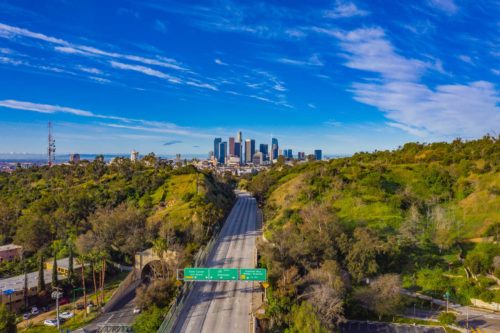
For a few weeks in March and April 2020, the COVID-19 lockdown brought about an unexpected side effect: dramatically cleaner air and endless vistas unlike anything cities have experienced in living memory. It reminded people that, despite huge and ongoing progress in cutting air pollution in the United States since the Clean Air Act was enacted five decades ago, nearly 150 million people living in America still regularly breathe unsafe outdoor air. And air pollution does not impact everyone equally. Race, more than income, has been linked to the disproportionate effects of dirty air.
As 2020 progressed, the pandemic, the economic downturn, and a growing reckoning with racial injustice in the United States converged to place economic, social, and public health strains on local governments. Efforts are now underway by these governments to help their communities recover. As they do so, there is an opportunity to implement local changes that can deliver multiple community benefits while also helping to accelerate recoveries. There is an opportunity to build back better.
Air quality and equity are highly interconnected issues. And there are actions cities can take to help address them both simultaneously. This report outlines four strategies that cities can use to improve air quality, mitigate the impact of the recession, and promote an equitable recovery:
- Phase out the use of fossil fuels in residential and commercial buildings: All-electric buildings have substantially reduced indoor air pollution, providing significant health and economic benefits.
- Improve access without relying on single-occupancy vehicles and accelerate vehicle electrification: Mobility solutions that prioritize people over cars enable equitable access to places of employment, healthcare, food, and recreation, while vehicle electrification is a vital and necessary strategy to reduce air pollution.
- Invest in urban greening: Urban forests and wetlands impact air quality, carbon sequestration, and water management. They also positively affect quality of life, mental health, economic performance, property values, and community resilience.
- Engage utilities to clean up the grid: Municipalities are large energy customers that can wield influence on utilities to transform their energy mix toward clean sources. Clean electricity generation eliminates emissions from fossil fuel combustion and improves air quality within city borders and beyond.
The report explains the key actions cities can take to implement these strategies and the multiple benefits that can be expected to result from them. These strategies can be a core component of local government efforts across the country to ensure their communities recover and build back better from the challenges of 2020.